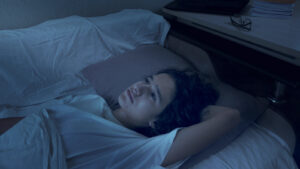Insomnia occurs when a person has plenty of time for a full night’s rest, but just can’t seem to fall asleep or stay asleep. Between 11% and 24% of teens experience insomnia—and rates of the disorder are highest among girls and teens 16 and older.
Insomnia can have a significant impact on an adolescent’s mood and school performance. We discuss common causes and consequences of insomnia in teens, ways caregivers can help teenagers sleep better, and when it’s time to see a doctor.
Trouble Sleeping?
We can help. Tell us about your sleep to get a free Sleep Doctor score with recommendations for better sleep.
What Causes Insomnia in Teens?
Insomnia in teens can have a variety of causes that are psychological, behavioral, or medical in nature.
It’s normal for both adults and teens to experience occasional bouts of insomnia. These brief stretches of troubled sleep are often associated with periods of stress or upheaval and usually last just a few days or weeks. However, sometimes brief periods of sleep troubles in teens can create unhealthy sleep habits that lead to persistent insomnia.
Conditioned Insomnia in Teens
Stressful life events, such as starting a new school, may give rise to insomnia symptoms. And once a teen experiences sleep difficulties, they may then feel anxiety about bedtime and not being able to sleep well. This can create a feedback loop in which worry about getting enough sleep makes it harder to fall and stay asleep.
Teens with conditioned insomnia often have or develop unhealthy habits that intensify and prolong their symptoms, including:
- Drink too much caffeine as a result of feeling sleepy during the day
- Take long afternoon naps that make it harder to fall asleep at bedtime
- Have an irregular sleep schedule
- Engage in screen time before bed or when they wake up in the night
Delayed Sleep-Wake Phase Disorder and Insomnia in Teens
Insomnia in teens may also be linked to delayed sleep-wake phase disorder, or DSWPD. DSWPD is a sleep disorder that often occurs in teens and young adults and causes a longer than average circadian rhythm—the internal clock that regulates when a person falls asleep and when they wake up.
Teens with DSWPD tend to be “night owls” because they generally don’t feel ready for bed until late in the evening or ready to wake up until late in the morning.
Teens experiencing DSWPD often struggle to fall asleep at a time that would allow them to get the sleep they need before rising for early morning classes. Thus, for many teens with DSWPD-related insomnia, the primary complaint is difficulty falling asleep.
Other Conditions and Disorders Associated with Insomnia in Teens
There are a number of other conditions and disorders that can interfere with sleep and contribute to the development of insomnia in teens.
- Attention Deficit Hyperactivity Disorder (ADHD): Teens with ADHD commonly report sleep problems, including difficulty falling asleep, difficulty staying asleep, and long periods of wakefulness at night.
- Autism Spectrum Disorder (ASD): About half of adolescents with ASD have sleep problems, including difficulty falling and staying asleep. People with ASD may experience disruptions or abnormalities in their circadian rhythms that contribute to the development of insomnia.
- Asthma: Teens with asthma may be woken by coughing or other asthma symptoms and have trouble falling back asleep.
- Sleep Disorders: Pre-existing sleep disorders like obstructive sleep apnea and restless legs syndrome may contribute to insomnia in teens by making it harder to fall asleep and stay asleep.
The Consequences of Insomnia in Teens
Sleep experts recommend that teens get between 8 to 10 hours of sleep every night. However, people with insomnia often get less sleep than they need and may also experience low quality sleep as a result of disruptions. This can lead to a state of sleep deprivation in teens with insomnia.
In the short-term, the fragmented, poor-quality sleep caused by insomnia can lead to:
- Low energy and daytime sleepiness
- Reduced motivation
- Lack of focus
- Forgetfulness
- Moodiness
- Difficulty controlling impulses and regulating emotions
Chronic insomnia can have far-reaching effects that impact a teen’s academic performance, mental health, and physical health.
Poor Academic Performance
Disrupted sleep has been linked to poor academic performance. In addition to having trouble focusing or staying awake in class, teens who do not get enough sleep may:
- be less receptive to their teachers
- care less about doing well in school
- struggle to see themselves as capable of academic success
Declines in Mental Health
Poor sleep may also contribute to declines in mental health. Sleep loss and disrupted sleep in teens have been linked to:
- Feelings of sadness and hopelessness
- Negativity
- Anxiety and depression
- Self-harm
- Suicidal thoughts
Teens whose changing circadian rhythms make them night owls have an increased likelihood of developing mood disorders, including depression. Unfortunately, mental health conditions can aggravate sleep problems, creating a vicious cycle.
If you are experiencing suicidal thoughts, or if you suspect a teen in your life might be contemplating suicide, please reach out to the National Suicide Prevention Lifeline at 1-800-273-TALK (8255).
Risks to Physical Safety and Health
Insomnia has the potential to affect the health and safety of teens who experience it. Teens with insomnia are vulnerable to errors and accidents that can affect their physical wellbeing. Sleep-deprived teens are also more likely than well rested-teens to take risks that put them in danger, such as driving under the influence of alcohol or drugs.
Teens who experience long-term insomnia are also at greater risk of developing obesity. Contributing to this possibility may be the fact that youth who don’t get enough sleep tend to limit their physical activity and spend more time in front of screens.
Finally, teenage insomnia has the potential to aggravate pre-existing medical conditions.
What To Do To Help Your Teen Sleep Better
If your teen is experiencing trouble falling asleep or staying asleep, a good first step is to have an open and honest conversation about their sleep issues. Ask your teen why they think they’re having trouble sleeping at night. Try to use a supportive and non-judgmental tone so that you can get truthful answers about what’s going on in their life and their bedtime routine.
For teens with conditioned insomnia, learning about healthy sleep and changing a few nighttime habits can make a big difference. Have a discussion with your teenager about the importance of sleep for their grades, mood, health, and safety. This may help them be more receptive to adopting healthy sleep hygiene practices, such as:
- Going to bed and getting up at the same time every day, even on weekends
- Limiting screen time before bed
- Cutting down on caffeine, especially later in the day
- Maintaining a quiet, dark, and cool sleep environment
- Finding healthy ways to deal with stress, like meditation or listening to music
When to Seek Professional Help
If your teen regularly has trouble falling asleep or staying asleep, talk with a healthcare professional, especially if their sleep problems are bothering them or interfering with their day-to-day life. A doctor can perform an evaluation, look over your teen’s medical history, and provide a proper diagnosis, if needed.
References
Ask the Sleep Doctor
Have questions about sleep? Submit them here! We use your questions to help us decide topics for articles, videos, and newsletters. We try to answer as many questions as possible. You can also send us an email. Please note, we cannot provide specific medical advice, and always recommend you contact your doctor for any medical matters.


